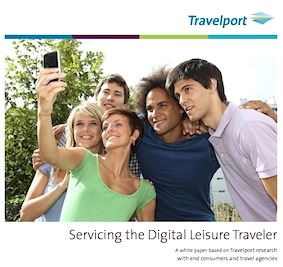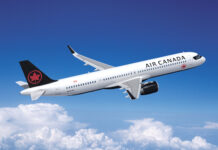Travelport has released the findings of an international survey providing insight into how digital leisure travellers plan and book their trips: from the frequency of their holidays to how they go about researching and planning their journey. While travel agents are often actively involved in the run up to a leisure traveller’s journey, only one in two continue involvement after a traveller boards their flight.
The study also explored their use of technology and social media and how travel agents can rise to the challenge of their evolving needs throughout their trips. Travelport estimates that the market for global intermediary leisure travel will be worth US$672 billion by 2015.

Investigating the varying opinions and preferences of the ‘digital natives’, (those under 35) and the ‘digital immigrants’, (those 36-45), key findings from the survey include:
- The need to stay connected and a heavy dependence on smartphones: 87% of those aged 35 and under, and 80% of those 36-45, owned or planned to purchase a smartphone in the next six months. This increased access to the Internet anytime, anywhere, is changing the expectations, demands and behaviours of leisure travellers.
- Higher levels of interest in accessing travel and destination information before a trip: treating the smartphone as a ‘personal assistant’. 60% of the ‘digital natives’, for example, consider a smartphone to be their ‘personal travel assistant or companion’ enabling interaction to take place at any time. Both groups prefer to access pre-travel information via mobile technology, rather than through traditional devices. This indicates the importance of travel itineraries that can be integrated with other apps, and formats that are easily read on mobile devices.
- Despite using their technology-savvy to research and book trips themselves, both groups of leisure travellers reported they are becoming increasingly confused with the amount of information on the web and were more likely to engage with a travel agent for complex trips.
The research also takes a look at how leisure travel agencies are servicing their travellers in terms of contact before and after the trip and the services they sell and concludes that opportunities to better service their ‘digital native’ and ‘digital immigrant’ customers exist. While travel agents are often actively involved in the run up to a leisure traveller’s journey, only one in two continue involvement after a traveller boards their flight. Yet the survey revealed growing interest from mobile users in receiving more promotional offers on hotels, dining offers, airport information and recommendations while they were away. In fact, 41% of travellers indicated they wanted to receive more relevant offers.
“This survey clearly highlights the importance of efficient technology solutions, more business intelligence and richness of functionality and content to ensure travel agents are fully supported in the sales process,” said Bryan Conway, Chief Marketing Officer, Travelport. “By delivering this we will empower travel agents to engage even more with their customers, especially those who have a good grasp on how to use new technology. It very much endorses our thinking and product strategy in these areas and we remain committed to developing innovative technology, such as the Travelport ViewTrip Mobile application and the Travelport Universal Desktop, that serves our customers well in this rapidly changing leisure travel landscape.”
Travelport conducted parallel studies with over 2,500 leisure travellers and 1,000 travel agencies in eight countries: Australia, Canada, France, Germany, India, UAE, UK and USA. The research was conducted in mid 2012 through an online survey email invitation to leisure agencies, and by the use of a third party panel company to consumers.
A full copy of the white paper, ‘Servicing the Digital Leisure Traveller’, including further details regarding survey methodology, can be downloaded on www.travelport.com/Travel-Trends/Whitepapers




